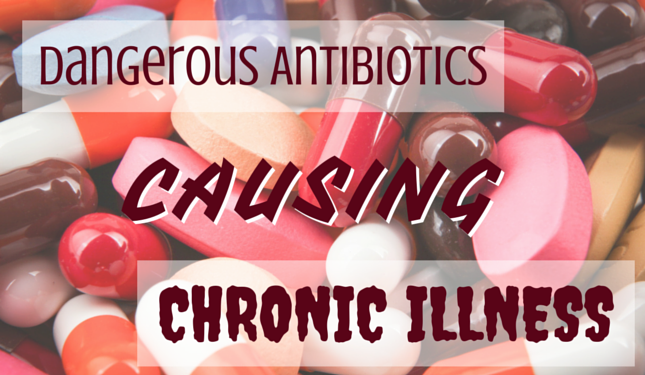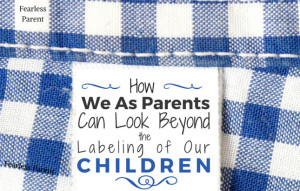Dangerous antibiotics?
Most people assume that antibiotics are benign drugs. They think that antibiotics kill bacteria while leaving human cells unscathed. They know that antibiotics have saved millions of lives, maybe theirs, and think of antibiotics as purely good drugs. They don’t think that there are dramatic differences in safety or efficacy between antibiotics and they think that as long as you’re not allergic to the antibiotic, it’s safe.
When they think about side-effects of antibiotics, most people think of an upset stomach, diarrhea or c. difficile (which can be deadly, but no one ever thinks that it can happen to them). They don’t think of chronic or psychiatric illnesses being caused by antibiotics, despite the many articles linking a healthy microbiome to the diseases of modernity and psychiatric illness. No, antibiotics are thought of as “good,” so they couldn’t do THAT. Besides, most people have taken an antibiotic, or dozens of antibiotics, without trouble, so they couldn’t be connected to chronic diseases, right?
Most of the assumptions that people make about the safety of antibiotics are true for many classes of antibiotics. Those in the penicillin class, cephalosporins, sulfonamides and tetracyclines, provided you are not allergic to them, have an excellent safety record.
Fluoroquinolone antibiotics are dangerous drugs
There is a rogue player in the antibiotic market though, a class of drugs that has severe, long-lasting side-effects; a class of drugs that causes multi-symptom, often chronic illness. This class of drugs that has more in common with chemo drugs than penicillin are fluoroquinolones – Cipro/ciprofloxacin, Levaquin/levofloxacin, Avelox/moxifloxacin, and a few others.
Fluoroquinolones are dangerous drugs. They do severe damage to human cells–depleting mitochondrial DNA, minerals and nutrients, and damaging cellular lipids. Fluoroquinolones not only destroy the microbiome, they cause a massive amount of oxidative stress within the gut. Their mechanism of action is that they are topoisomerase interrupters, meaning that they disrupt the DNA and RNA replication process for bacteria (and mitochondria).
Fluoroquinolone antibiotics lead to chronic illness
The severe cellular damage done by fluoroquinolones leads them to cause the multiple symptoms listed on the 43 PAGE warning label. The warnings listed include increased risk of tendon ruptures, permanent peripheral neuropathy, serious psychiatric problems including “nervousness, agitation, insomnia, anxiety, nightmares and paranoia,” renal impairment, prolongation of the QT interval, and many other serious adverse effects. What the warning label fails to mention is that many of these symptoms, and more, can happen all at once and that Fluoroquinolone Toxicity Syndrome looks, feels and is often mistaken for autoimmune diseases, fibromyalgia, CFS/ME, autonomic nervous system diseases like POTS, psychiatric illnesses and many other multi-symptom, chronic illnesses.
Stories of patients with Fluoroquinolone Toxicity Syndrome can be found on The Fluoroquinolone Wall of Pain. Note that all the reactions are multi-systemic, severe and long-lasting.
Delayed adverse reactions, tolerance thresholds, and the absurdity of an antibiotic leading to multi-symptom illness make it difficult to recognize Fluoroquinolone Toxicity Syndrome. Most doctors are not trained to link chronic disease states to antibiotic use, and thus the connections are often ignored.
As drugs that damage mitochondria, cause a massive amount of oxidative stress both in the gut and throughout the body, deplete antioxidants, cause “leakage of cellular components” and the downgrading of neurotransmitters, OF COURSE fluoroquinolones lead to many chronic diseases of cellular destruction. But because fluoroquinolones are thought of as simple antibiotics (they truly should be thought of as chemo drugs, like all other topoisomerase interrupters), the connections between fluoroquinolones and chronic diseases are not made by many people.
Suddenly sickened by Ciprofloxacin
I was 32 years old and extraordinarily healthy when I got knocked down by my second round of Cipro (I was fine after my first experience with Cipro–the tolerance thresholds are tricky). I went from going to the gym daily to barely being able to walk a block. I went from being a voracious reader to losing my reading comprehension, memory and concentration. I went from energetic and strong to weak and exhausted. I was sick for 18 months. I was lucky in many ways-my reaction was less severe than that of many people, and I was able to recover. Sadly, some people suffer from permanent damage/illness from fluoroquinolones.
I felt as if a bomb had gone off in my body and mind, and I was terrified that I would never be able to be the athletic, smart person I had always considered myself to be. Though I did recover, damaging my cells and sickening me for 18 months of my early 30s to treat a urinary tract infection is not acceptable–especially because there are safer options for treating urinary tract infections available.
Protect your loved ones
The destruction of body, mind and spirit that people go through when they experience fluoroquinolone toxicity is horrible. My heart aches at the thought of anyone going through what I went through. My heart especially breaks for the children and elderly people who go through fluoroquinolone toxicity. Children and the elderly don’t have the strength or the voice that I had–both of which helped me through my time of sickness. I ask the strong and healthy adults who are reading this to please, please protect your children and elderly parents (or grandparents) from getting poisoned by fluoroquinolones. They are dangerous drugs. They are given to children (especially in the form of ear and eye drops) despite their contraindication in the pediatric population. They are given to seniors frequently, despite the fact that drug clearance and renal activity tends to decrease with age, thus increasing the risk of fluoroquinolone toxicity for seniors. Tragically, a child and a senior have almost certainly been given a fluoroquinolone in the time that you have taken to read this. Some of them may be severely injured by the drug.
There is nothing okay about children suffering from permanently weakened tendons throughout their body, or autonomic nervous system dysfunction that leaves them unable to digest food properly, or debilitating insomnia and anxiety, or permanent peripheral neuropathy from taking a fluoroquinolone. Official estimates of fluoroquinolone adverse reactions range from 4-20%.
Given the severity of the adverse effects, it’s not a risk that you should take with the health of your child.
There is nothing okay about fluoroquinolone-induced chronic illness hurting people of any age when there are safer alternatives available. Please be careful with yourself too.
 Lisa Bloomquist is a patient advocate who was injured by Cipro in 2011. She runs Floxie Hope, a fluoroquinolone toxicity advocacy site, and manages The Fluoroquinolone Wall of Pain. Lisa is a guest blogger for Hormones Matter and Collective Evolution, and hosts The Floxie Hope Podcast. Lisa has vowed to continue to screaming about the dangers of fluoroquinolone antibiotics until those in the medical professions start paying attention to their Hippocratic Oath, until proper informed consent is established for administration of these drugs, and until physicians stop giving them to children. Lisa is a Colorado native who enjoys the mountains, Pilates, and her cat. She has a BA in Economics from Colorado State University and a Masters in Public Administration from University of Colorado, Denver.
Lisa Bloomquist is a patient advocate who was injured by Cipro in 2011. She runs Floxie Hope, a fluoroquinolone toxicity advocacy site, and manages The Fluoroquinolone Wall of Pain. Lisa is a guest blogger for Hormones Matter and Collective Evolution, and hosts The Floxie Hope Podcast. Lisa has vowed to continue to screaming about the dangers of fluoroquinolone antibiotics until those in the medical professions start paying attention to their Hippocratic Oath, until proper informed consent is established for administration of these drugs, and until physicians stop giving them to children. Lisa is a Colorado native who enjoys the mountains, Pilates, and her cat. She has a BA in Economics from Colorado State University and a Masters in Public Administration from University of Colorado, Denver.













I think that is one of the best comments I have read on line. I actually read it twice. If only I had all this knowledge in 2009 life could have been so different for me. But self pity will get me nowhere. You American friends have saved my life. Lisa who always gives me hope and Patti who is so wonderful. I love all the group sincerely and one day if I ever feel well enough I will go to Washington and meet ye all. I was so sick I could not go last time. I am bad at the minute my doctor put me on 75mg of Lyrica MADE BY PHIZER I have my doubts it as I looked it up in the MIMS and got a fright reading the side effects.
Thank you, Mary! Support groups are incredibly valuable, for sure!
I agree – we should all beware of anything we put on our skin or ingest!
http://www.facebook.com/excitingoils
LYRICA/PRGABELIN IMHO IS DEFINITELY A DRUG TO AVOID. it caused cortical myoclonus in me.
I agree, Cindy. For me the bad effects far out weighed any improvement, which was very slight, and may have come w/o the Lyrica.
i have been given Leviquin many times by multiple doctors over the years. Readingthisarticle has given me a wake up call. I also suffer from CML, a type of leukemia. My energy level and sleep habits have decreased over the years and anxiety has increased. I am now wondering if it is because of these drugs. I am allergic to penicillin and Ancef, so the drug of choice for me has been Leviquin,even when I get a bad cold to prevent pneumonia because of the leukemia. Something to think about.
Thank you very much for reading the article and for commenting, Shelley! I’m so sorry to hear about your heath problems! Sorting out exactly which ones are (or even may be) due to the Levaquin and which ones aren’t is difficult – to say the least. Here is some information about how fluoroquinolone antibiotics can lead to anxiety and insomnia via downgrading of GABA-A receptors – http://www.pharmacologyweekly.com/custom/archived-content/pharmacotherapy/118 Fluoroquinolones do similar things to GABA receptors as what happens when people go through benzodiazepine withdrawal. Unfortunately, the downgrading of the GABA-A receptors can be long-lasting. Here is a link with supplement recommendations for dealing with anxiety that I found to be helpful and interesting – http://www.longecity.org/forum/topic/54028-treating-anxiety-safely-effectively/
There is a lot of information about fluoroquinolone antibiotic toxicity available online. My site, http://www.floxiehope.com, has a lot of articles in the Links & Resources section. There are also support groups on facebook that are invaluable. The biggest one can be found through searching for “Fluoroquinolone Toxicity Group” on facebook.
Best regards,
Lisa
After having taken Cipro many times for diverticulitis, and never associating it with my tendon pain and 2 leg surgeries and surgery on both shoulders for tendon issues, I finally put the 2 together when I got a prescription for Cipro with a note rubber banded around the prescription bottle about tendon issues and tendon rupture, I decided never to take Cipro again.
Unfortunately, when I asked not to be given Cipro, I was given Levaquin, and not knowing it was the same family of drugs I took it. That was a year ago. I very much regret it. My life is a mess, I can’t go for a walk without someone going with me, as I have “zone outs” which don’t show as seizures on an EEG, but to all appearances seem to be seizures, so I also don’t drive. I can’t think straight, I have anxiety and panic attacks, I am in moderate pain constantly, sometimes becoming severe. These are just a few of my symptoms. And yet, according to every test, there is “nothing wrong” with me.
This is the scariest thing I have ever had to go through in my life, and yet, my case is mild compared to most cases I’ve read abou!
I’m so sorry for everything that you’re going through, Susan!
When you are going through so much, and the tests say that there is “nothing wrong” with you, it shows how woefully inadequate the tests are.
Have you looked into CBD oil for relief of your seizures? Some people have reported relief from some fluoroquinolone toxicity symptoms with CBD oil, and there have been many reports of relief of seizures from CBD oil. I also recommend that you take a look at the link from Longecity that I put up in response to Shelley’s post. It’s a good one for anxiety symptoms.
You are not alone. There are stories of healing, as well as supportive people, on http://www.floxiehope.com. There are also facebook groups of people who are happy to help.
Hugs,
Lisa
Since first visit to your blog I appreciate the information you post. I’ve always been skeptical about prescriptions and always ask questions of doctors, the few I’ve dealt with over 76 years. Many don’t know the side effects, and deny drugs are that dangerous as we know differently.
One thing would be great, post links that inform of the safe drugs and especially the natural nutrient alternatives which are extremely powerful, even for treating and preventing ebola and diseases that no longer respond to many antibiotics of today. On my blog I mention three of the safest and most affordable preventive and remedy nutrients– Silver Sol Solution 10ppm, kefir water, or kefir milk. Research these and get past the typical nay saying and you may be amazed what just those three are capable of. Hope this is helpful.
Thank you, Nicasio! I wish that I had always been as careful and skeptical as you when approaching pharmaceuticals. Unfortunately, I learned the hard way that they can be dangerous. There are many wonderful natural antibiotics. Silver, probiotics, garlic, honey, d-mannose, andrographis, and many others are wonderful antibiotics and they have few side-effects. They should be used first. I wish they were used first more often.
i took A 10 day supply of Leviquin 500mg during Christmas,I had to take suppositories with them to keep them down .I have been given these 2times for pneumonia .I am allergic to sulfur drugs.What can I take ?
Hi Faye,
First thing that you should note is that it warns on the labels of all fluoroquinolones/quinolones that you shouldn’t take them if you have EVER had an adverse reaction to another quinolone. So, it is quite important that you stay away from Levaquin, Avelox, Cipro and any other fluoroquinolone/quinolone antibiotic.
Here is a post that I wrote about antibiotics after fluoroquinolone toxicity – http://floxiehope.com/2014/08/08/antibiotics-after-fluoroquinolone-toxicity/
The alternative/natural antibiotics mentioned in my comment above in response to Nicasio’s question are also good to look into.
I hope that helps!
Regards,
Lisa
I am desperately searching for help there are no doctors that will listen to me I have been bed ridden off and on for seven years I am on several medications for everyone they say I have but am never getting better the best part of my life with my kids has been devastated by this I am 33 years old I’ve been sick for going on 7 years the Drs have been putting me on me all of those bad antibiotics for this whole time because I am deadly allergic to penicillin drugs I live in severe pain and weakness daily I want my life back I used to ride dirt bikes swim across the lakes play with my babies run miles hike fish camp I’ve not been able to do anything and my heart is so broken the time lost with my kids the money issues etc. Is intolerable please if anyone knows any information as to how to get help God bless
I’m so sorry for both the late reply and everything that you are going through, Melessa! There are stories of recovery on http://www.floxiehope.com that may be helpful. Lots of things help people. Loading up on magnesium, B vitamins, glutatione injections, acupuncture, chiropractic, etc. all have helped people through chronic illness brought on by these antibiotics. I think that the loss of self is one of the most difficult aspects of this, and all other, chronic illness. Prayer and spirituality work helped me through a lot of the pain brought on by my loss of self.
Hugs!
Lisa
20 yrs ago I was prescribed “Floxin” a new miracle antibiotic for a resistant UTI infection..within weeks..I began experiencing a series of different neurological symptoms … Over the next 2 yrs I was seen and tested by a number of specialists for MS and spinal cord cancers…nothing was found…eventually my doctor convinced me that the symptoms were somatic and likely related to stress…I followed this by exploring meditation and various other stress management activities…the neurological symptoms seemed to fade but never completely left..,13 yrs later I was given cipro routinely for another infection…almost immediately the neurological symptoms intensified along with severe tendinitis….I was asked to stay on cipro for the next 6 weeks…my doctor still insisted my symptoms were stress related and began treating me for anxiety..the symptoms worsened…I wasn’t buying the somatic story any more and did a side effect search of my own..up popped FDA and Health Canada warnings of the dangers of this family of toxic antibiotics…I took these warnings into my doctor…he had no idea these warning existed…I never went back to this clown..I soon began experiencing a series of small tendon tears…2 yrs ago while lifting a bed frame I tore my biceps tendon completely out of my left elbow requiring emergency surgery to reattach the tendon…I’ve been able to regain the strength in my arm but still suffer from neurological and tendon and joint weaknesses…I’m convinced these will be life long effects of these very dangerous drugs..,
One month ago our world came crashing down when our 13 year daughter was diagnosed with type 1 diabetes. In April she had been put on solodyn (low dose antibiotic) for acne
She had been on an antibiotic only once or twice in her life before this. I know this did something to my daughters immunity but cannot get any feedback from her doctors. We are heartbroken .
If anyone has any information about this happening to someone they know please we need to inform people of the dangers of antibiotics
I was given cipro for diverticulitis,I had the prescription filled but when I read the 4 pages of horrible side effects I decided not to take it.I went online and saw many horror stories from people that have used it.Once I was given Levaquin for the flu ,I took one pill and had such bad leg pain that I immediately stopped it.What else can I take to help with this problem? Are there any other choices that may help,either other antibiotic or natural solutions?
Thank you
I too have been effected terribly by Levaquin…I was put on morphine and later phentenyl..Neither got rid of the pain. I found out about Borax from a old natural health book by Dr. Morton Walker. You put 1/4 teaspoon of borax in a quart of water and drink during the day…ZERO PAIN and it also chelates heavy metal out of your system. This works for ANY PAIN…Make the water HOT so as to dissolve the borax…They give a demonstration on how to make this solution on http://www.earthclinic.com I also have 9 pages of natural cures on there under the name Mr. Ree as I do not want mainstream medical people to know my name..Nespa?
HI
My heart goes out to you all. I’m going off topic here, but this is so important I must share this with you.
I live in the UK and here as in many other countries there has been a focus on End Of Life Care. Before becoming sick I was a nurse. During my time in nursing 23+ years ago, end of life or pallative care was all about controlling pain, helping patients eat and drink, preventing pressure sores etc… Today things are very different, End Of Life Care is not what is used to be.
In the UK End Of Life Care involves the removal of food and fluids, an increase in strong IV painkillers and the use of anesthetic drugs to keep patients in a comatosed state. Patients live on average 33 hours on this protocol. They don’t die of there illnesses or disease, but instead die of dehydration or respiritory arrest.
When fluids are stopped the patients start to get confused, in the UK this confusion results in the 2005 Mental Incapacity Act being implemented, the patient is declared metally incapable of making decisions for them selves. The doctor brings in whats called Best Practice, and relatives are told the patient is dying. The dying patient has no need for food and fluids and ultimately dies of starvation and dehydration.
This is happening to all ages, babies and children in the UK too. After confusion sets in the patients body starts to shut down, the liiver and kidneys fail and the patient is in sever pain, the IV painkillers are then increased. This increase in painkillers, usually morphine often leads to respiritory arrest, and because the doctor has declared the patient to be dying the patient will not be resusitated.
Patients die in terrible pain, sometimes the tongue dries out and splits with blood pouring out of the patients mouth, in rare cases jaw bones collaps. I can’t think is a more cruel way to die.
If you have a friend or family member recieving hospital care, please watch them carefully. Look for things like food trays and water jugs being put out of reach. Is your relative complaining of being hungry or thirsty. Have they been declared nil by mouth for no obvious reason, have IV fluids been removed. Have you been told your relative can’t drink because they have fluid on the lungs, if so ask for a chest drain to be inserted to drain off this fluid. Sometimes relatives are told the patient is nil by mouth until they have been seen by a dietitian, but the dietitian never shows up. Nurses blame the doctors, they say things like: it’s not my call, I’m only doing my job, it’s the doctors decisions, I have to do as I’m told.
Ask questions, bring in food and water for your relative, visit hospital at meal times and make sure your relative is getting enough food and water. You can make a difference. Without food and water we die, it’s that simple.
The doctors in the Uk have been protected as our government has reclassafied food and water as medicines and doctors can choose not to perscribe medicine.
Food and water are not medicine, they are essential for life, they should be part of basic nursing care, at least they used to be in the UK.
My Husband is sick and I was looking to find ways to help him online when I discovered End Of Life Care in the UK. As an ex nurse I am outraged by this practise, it is utterly evil.
Hi Paula,
Thank you so much for letting all of us know! I have learned that nurses know the problems with the medical system, and that they should be listened to. Thank you for reaching out and pushing back! I hope that it saves some lives.
Regards,
Lisa
How many people have to suffer these side-effects before Doctors stop prescribing dangerous drugs unless serious illness or death will likely result from NOT taking them? I have begun researching every drug my husband or I are prescribed. So far, I’ve rejected Prolia to treat my recently diagnosed osteoporosis and a Levaquin derivative my 78 year old husband was prescribed for bronchitis…and it was not diagnosed as bacterial. Are there statistics to show the percentage of people suffering serious side-effects or death among those taking Levaquin type antibiotics . . . and other “black box” drugs?
Hi Margaret,
Great job looking out for yourself and your husband! Drugs with serious consequences (“side-effects”) should be prescribed with extreme caution, and drugs with black-box warnings should only be prescribed in life-or-death circumstances. However, doctors aren’t doing that, and patients need to look out for themselves. Great job doing the necessary research and advocating for yourself!
I don’t know of any statistics specifically on drugs with black box warnings. Sorry! It’s an area that should be studied much more extensively.
Regards,
Lisa
after a hospital visit a overdose of generic leverquin that nearly took my life jan 2014 i am learning more about it yes within 4 days i sat in my drs office complaining about my hands and feet today i am learning that the same drug causes causes aortic aneurysms i have been found to have two they say this is a black box drug really well we did find this out but not till my husband started looking stuff up not a word was spoken in the er so spread the word to all your family members or total strangers DO NOT TAKE THIS DRUG OR CIPRO
Hi Ann,
I am so sorry to hear of all that you have been through! Thank you for helping to spread the message that Levaquin and Cipro are dangerous drugs!
Have you contacted lawyers about your case? There are very few cases that are being taken right now, but plaintiffs who have had aoritc aneurisms after taking Cipro or Levaquin are being heard right now. If you do a search for “law firms” on the following page, you will get a list of law firms that are taking fluoroquinolone cases – https://floxiehope.com/fluoroquinolones-links-resources/. The fact that you took generic Levaquin may stand in your way. It’s absurd and wrong if it does. I hate that people who take generic drugs have an even more difficult time suing than those who take the name-brand drugs. It’s way too difficult for victims to get justice.
Please keep spreading the word, and thanks!
Best regards,
Lisa
This is such an important site.It is now time that people(patients) assume more responsibility for what Doctors recklessly prescribe.I was prescribed Levaquin by a very “friendly”doctor after a positive test for pneumonia in hospital.I was not warned of the unbelievable side effects—-assuming that the Doctor was looking after my interests –never will I assume that again!!!!!!!…..a few months late,I am still coping with a numb area in my right upper thigh and numerous recurring ligament/tendon problems in my knees——-only since the Levaquin !!!!!
Recieved Levaquin i.v. for UTI.Developed severe side effects,tendonitis,weekness,severe burning,severe itching,brain fog,etc.I have been in reclining chair fot twenty months,24 hours a day.I have been rairoaded from one specialist to another,so far status quo.Taking a great variety of supplements,Neurontin,diet,massage,CBD, no relief.I need 24 hour care,my energy and financial resources are depleting.Is there anyone With some ecouraging suggestion
Hi Peter,
I’m so sorry for everything you’re going through! I’m so sorry for all that these horrible drugs have taken away from you. It sounds like you are trying a lot of things that have helped other people, and I hope that they help you too. Here is a post with some other suggestions – https://floxiehope.com/2015/10/12/im-floxed-now-what/. If you haven’t already, I suggest reading the stories on floxiehope.com. They’re each full of good and helpful advice. I also suggest avoiding fluoride as completely as humanly possible.
Prayers and hugs going in your direction.
Regards,
Lisa
Lisa, I have five 500 mg pills remaining to take of Levofloxacin for my diverticlitis. I’m also taking metronidazole with it. It is scary how these meds. make me feel. Is there any safer drug I can take for this condition ?
Hi Fred,
Eek! I always hate hearing from people who are in the midst of taking fluoroquinolones because I always get scared for them. I’ll try to be as calm and rational as possible though.
I’m not a doctor, and I don’t know the best treatment for diverticulitis. If I were in your shoes, I would ask my doctor if I could get by with just the metronidazole. Also, there are some natural antibiotics that may be helpful supplements. Here is an interesting article about how silver makes antibiotics more effective – https://www.scientificamerican.com/article/silver-makes-antibiotics-thousands-of-times-more-effective/. It’s just one example, and perhaps a naturopath (or Dr. Google) can point you toward other natural antibiotics.
Here is a post about mitigating some of the damage done by fluoroquinolones. I hope it helps! https://floxiehope.com/2016/02/25/mitigating-fluoroquinolone-damage/
Regards,
Lisa
Many years ago about twenty I used to drive, loved driving. I was put on antibiotics for a trivial illness. I had a reaction nothing else could have caused this. Whilst driving my skin peeled off my fingertips one by one and I found it hard to breathe. Thought I was dying actually. I couldn’t maintain my breathe. I managed to pull over my car and park up safely. I got my breathe back after twenty minutes. My Doctor said what had I been touching in the garden cos of my skin lifting off my fingers. I obviously had an anaphylactic shock. Nothing else I believe could have caused this. After recovering I tried driving but my brain seemed to remember the trauma and my breathing was panicky and I seemed to relive the experience apart from my finger blisters. I kept my car for one year but same and same again my breathing was unstable. To this day I’m very upset about not being able to drive. I live with what’s happened but have lost my freedom to go places especially taking my children out well my younger one. I suffer from agoraphobia and lost a lot when taking these antibiotics. My mother is allergic To penicillin. Oh dear I wish I could still drive. It’s been twenty years now since it happened I feel as though I’ve been in solitary confinement without my car. My son has suffered and so did my daughter. She had to be taken out of a school cos I couldn’t drive to get there. All sorts of troubles I’ve had particularly losing my freedom. Damn you antibiotics. These things are not to be taken for granted they could kill you if you are allergic. Be careful.